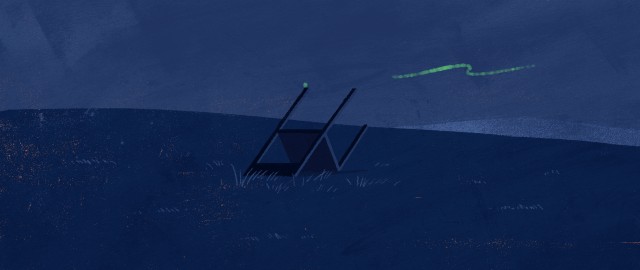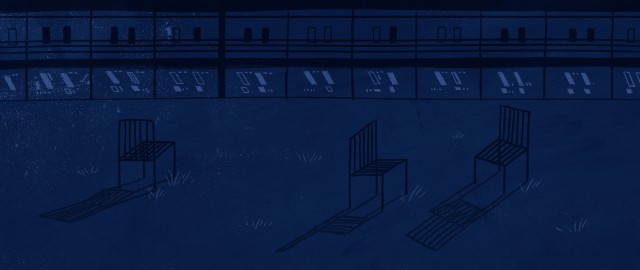The World Health Organisation estimates that one in four of us will be troubled with a mental disorder in our lifetime. With mental health an ongoing issue, what can we do to help? For filmmaker Ivyy Chen, after she witnessed both friends and family experiencing depression and anxiety attacks, she opted to do what she did best and turned to filmmaking to offer solace. Creating a story that she hoped “would comfort them at their lowest”, 椅島 (Isle of Chair) is a poetic, sombre animation dedicated to anyone experiencing troubled times.
A quiet and unassuming short, Chen’s film is loose in traditional narrative structure, with its lyrical storyline difficult to describe, but open to interpretation. Essentially, the tale of an island seemingly inhabited by only a wandering giant and a selection of miscellaneous chairs (wasn’t as difficult to describe as I initially made out), Chen has her own beliefs about what the film should inspire in its audience, but the beauty of a film like this, is you will all take something different from it.

The chair represents “how mental health was defined as an abnormal state by society”
“I used the upside-down, dysfunctional and broken chairs to represent how mental health was defined as an abnormal state by society”, Chen explains as we discuss the role of furniture in Isle of Chair. Explaining that she found the upturned seat to be a symbol of peoples discomfort for things not acting as they should, Chen used her film to create a sense of peace, in herself and others.
“The ups are always awaiting after the downs”
“This story has imperceptibly become a support for myself to get through many difficulties in life”, she reveals. “It reminded me the ups are always waiting after the downs, the notion of normality was merely defined by someone’s perspective. I also wanted to create a space where everyone is safe to have a moment to allow sadness and negativity to happen, as well as to have a chance to make peace with themselves through connecting with others”.
“Most people go about their lives unconscious of their deformities, while in this little world of ours the deformities themselves are a precondition” – Though the film opens with this quote (that Chen describes as the “backbone” of her story) from Haruki Murakami’s book, Norwegian Wood, the concept of Isle of Chair reminded me more of a classic philosophical question – If a tree falls in a forest and no one is around to hear it, does it make a sound?
“If the chair can never stand in a way that you prefer, would you let it be?”
Both the short and the riddle are concerned with provoking discussions around perception and both are open to interpretation. In fact, Chen even has her own philosophical question, based around the ideas in her film – “if the chair can never stand in a way that you prefer, would you let it be?”.
Putting philosophical discussions to one side for a moment, Isle of Chair is a film that opens another interesting question – does context improve the viewing experience? With Chen’s film, it’s easier to take something from it, when you know what she was aiming for, but without that background information, is it still as powerful?

One of the many calming, peaceful shots from Isle of Chair
For me, I was instantly drawn to the sense of peace in the film, but on first viewing I thought it was more a narrative revolving around the impact of humanity on the natural world. Now I know the directors aims, I can see them clearly throughout the film, but should the story behind the film, make the story within the film better? At S/W we always agreed it shouldn’t – but in the case of Isle of Chair, knowing Chen’s motivations, I can’t help but like her film a little more.
Made using Photoshop, TVPaint, After Effects and Charcoal & paper, Chen admits the biggest challenge in creating Isle of Chair was making the movements as “gentle and slow as possible”. She is also hoping, sometime in the future, to curate an exhibition (working with a furniture studio in London) to show her picture book The Chair of Life and screen her other 2 chair films. She is also working on a new story about chairs and another story focusing on languages and cross-culture experiences – a sequel story to her grad film Lost in Words.

 Rob Munday
Rob Munday